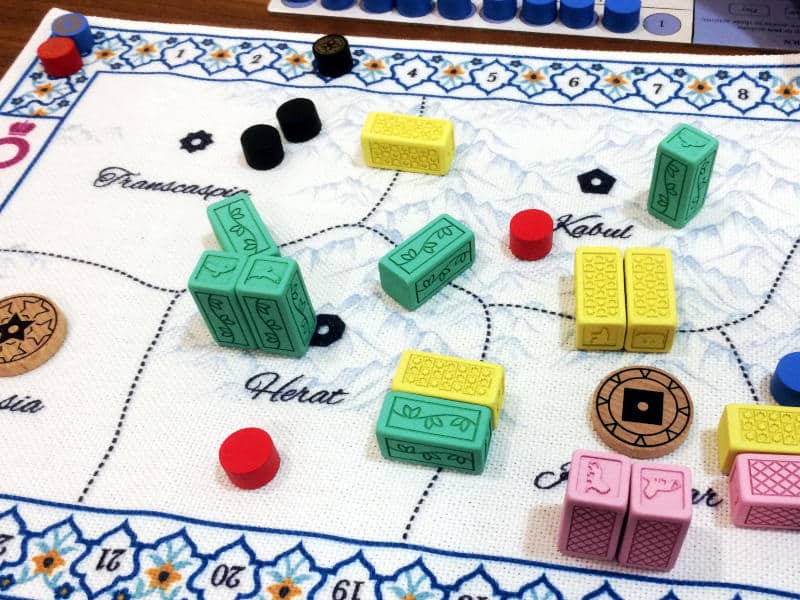I was reading Dan Thurot’s most recent article, titled “Anti-Fun”, when, as so often with his writing, I found myself challenged in the best possible way. Few people in board game criticism can cut to the heart of a topic like Dan can. That is why his work is so valuable and important. So, as I say, I felt challenged. His argument that the word “fun” has no real use in criticism struck me as too dismissive. To my mind, the word “fun” still holds value, even if it cannot stand alone. So, this article is my reply to the argument he makes in his article.
Listen to the Audio Version
Intro Music: Bomber (Sting) by Riot (https://www.
Music by: https://www.
License code: I3ZNA6I4QC5EPH6U
Artist: : Yunior Arronte
Royalty Free Music: https://www.
License code: LCSEP3IJP8ULUQ8K
Artist: : Dreamt
Music by Bensound.com
License code: CGYD1KYW0CT6JCB1
Artist: : Vital
Fun is Fun is Fun is Fun
Whenever I say I had “fun” playing a board game, I am not necessarily providing deep analysis. Dan is right in pointing out that the word is broad, rather slippery, and easily overused. Still, I think “fun” captures something immediate and human. We all know “fun” when we feel it, even if we cannot always pin it down in precise words. When we sit down as a family to play a game of Doomlings and laugh about the absurdity of some of the cards, weaving a story of extinction spun out of nothing, we all know we had “fun”. It may not be the most exacting description, but it is one that resonates and has meaning.
“Fun” might not capture fully why a game successfully creates enjoyment or is entertaining, but it does communicate that it was successful in its goal. That is no small achievement. A game that can make people laugh, smile, or stay engaged until the very end has achieved something important. In that sense, “fun” is a useful shorthand, one that tells readers of my reviews something about the experience the game creates, even if the term leaves questions unanswered and requires me to add more detail.
When relatives or friends ask me to recommend a game to them, they rarely begin with questions about complexity or theme. More often, they ask whether I think it would be “fun” for them. “Fun” is often the doorway into that conversation.
Of course, not all games are intended to be “fun” in the same way. Some are serious, sombre, or challenging. Yet without the word “fun”, the language of criticism risks losing the warmth of enjoyment, especially for those games whose primary goal is to bring “fun” and laughter to the table.
Absurd Fun
Of course, “fun” comes in different flavours, and that’s where the fuzziness begins. I might find a game of Pax Pamir to be “fun”, but that’s not the same kind of “fun” as the chaotic cardplay of Doomlings. One demands focus, planning, and strategy, while the other is light-hearted, silly, and often absurd. Yet, both can still be described as “fun”, even though the experiences could not be more different. The word stretches to cover both, but it does so because enjoyment, in its many forms, sits at the centre of play.
That does not mean I would use the word “fun” in the same way in both of my reviews.
If I told someone who knew Pax Pamir that I thought it was a “fun” game, they might look at me oddly, unsure whether I was making “fun” of them. They might expect me to describe it as tense, challenging, or perhaps even draining.
However, I would have no hesitation calling Doomlings a “fun” game, and I am confident most people would understand exactly what I meant. “Fun” here communicates something useful, even if it remains a broad term.
That, I think, is where Dan’s argument begins, and it is also where I start to disagree with him.
His article takes the word “fun” apart, describing all its various meanings, until nothing is left. By the end, the word feels empty and useless. That emptiness supports the rest of his discussion and his ultimate conclusion. Yet, how he got there doesn’t feel right to me. I think it could weaken his overall points and his findings, which I largely agree with. You should definitely read his article.
However, I feel that any term can be dissected to ad absurdum. So let me illustrate what I mean.

Profound Fun
Dan suggests a number of terms that are more useful than “fun”. So let me take “profundity” as an example. Dan says that the term is for games “that make me see a topic from a fresh perspective, or games that shine a light into the deepest recesses of my mind. Sometimes we enjoy things because they make us think more deeply, or at least imagine we do.”
So, at first glance, “profundity” feels like a very strong word, but let me dissect it in the same way as Dan did for “fun”, to show how it can also feel meaningless.
Pax Pamir, for example, is a game that makes me see the period that Western historians call “the Great Game” differently. It makes me think more deeply about that part of the 19th century in Central Asia. That’s what the game seems to set out to do, and it certainly achieves it. So, that makes Pax Pamir a “profound” game.
Yet “profundity” doesn’t describe whether it’s the game’s narrative, its mechanisms, or the emotions the game stirs that create that quality. Without explanation, the word just hangs in the air. On its own, it explains very little.
If “profundity” means depth of thinking, then games like Chess or Go are also “profound”. If it applies to games that make me see a topic from a fresh perspective, then games like Fetching Feathers or Wingspan could also count, because they make me look at birds in a different way.
Of course, I wouldn’t actually say that Fetching Feathers or Wingspan are “profound” games, just like I wouldn’t call Pax Pamir “fun”. I’m merely trying to show that the term “profundity” can be dismantled, stretched, and dissected in the same way that Dan took the meaning of “fun” and made it meaningless. In reality, I think the term “profundity” can be a valuable way to describe certain games. My point is merely that it is no stronger than “fun”.
Context Is Everything
In my view, what makes any term meaningful is context. When I write a board game review, I try to not only offer analysis, but a sense of how it felt to play. Words like “fun” and “profundity” can be starting points, but they only mean something when they have context.
Imagine a friend telling you their holiday was “amazing”. That word alone does not explain much, but it does tell me that they had a great time. At the same time, it doesn’t mean that I would have found their holiday just as “amazing” as they did.
Or consider a meal. If I say it was “delicious”, the word tells you something real, even if it leaves questions. It might have been “delicious” because of the flavour, the texture, the presentation, or maybe even the company at the table. Without further explanation, I cannot tell which. Yet I still know that the experience was positive, which is an important piece of information.
Removing “delicious” from my vocabulary would not make me a better food critic, just as calling a holiday “good” isn’t as meaningful as calling it “amazing”.
It is the same with board games. A review that exclaims that a game is “fun” or “profound” is not failing, so long as it is not the only conclusion it draws. The richness of criticism lies in combining words and layering meanings, not reducing our vocabulary. A thoughtful review might say a game was “fun”, and then go on to describe how its mechanisms create tension, how its art adds atmosphere, and how its design reflects certain ideas. “Fun” is not the full picture, but it belongs in the frame. In this way, “fun” is not an enemy of meaningful criticism, but a partner.

Keeping the Fun
What I value most in board game reviews is how they describe the experience and emotions a game creates. Reviews that never evaluate the “fun” a game creates miss the mark, in my view, and risk sounding as if they are written about artefacts rather than actual gameplay experiences.
That doesn’t mean that every game must be “fun”. Some games are meant to lack “fun”. Instead, they’re meant to be “serious”, another term that can feel vague. A review should explain why these games lack “fun” and focus on the serious points they make.
Yet, “fun”, or its lack, is like a thread that ties together different fabrics of play.
In closing, let me repeat how much I respect Dan Thurot and his articles. They never fail to make me think, and this piece is no exception. My response is offered in that spirit, as a sign of how valuable his writing is to the community.
While I focused on “fun” in this article, which is my reply to his post, I also completely acknowledge that his discussion makes many important points. The terms he mentions and suggests are important ones that I will consider more carefully in my own reviews going forward. His article has given me plenty of food for thought.
I even mostly agree with his conclusion, especially that “when it comes to something as multifaceted as human play, we deserve a wide-ranging and questing vocabulary to describe what’s going on at the table.” – even though I disagree that “‘fun’ just doesn’t cut it.” The word “fun” may not be the whole story, but together with other words, it helps us capture the full richness of play. I strongly feel that without “fun”, something essential would be missing.
If you enjoyed this article, please have a look at my support page to see how you can help keep the blog going.
Useful Links
- Space-Biff “Anti-Fun” article: https://spacebiff.
com/ 2025/ 09/ 30/ anti-fun/ - Doomlings review: https://tabletopgamesblog.
com/ 2024/ 06/ 01/ doomlings-saturday-review/ - Pax Pamir review: https://tabletopgamesblog.
com/ 2022/ 08/ 27/ pax-pamir-second-edition-saturday-review/ - Fetching Feathers review: https://tabletopgamesblog.
com/ 2025/ 09/ 27/ fetching-feathers-saturday-review/ - Wingspan review: https://tabletopgamesblog.
com/ 2019/ 03/ 16/ wingspan/


